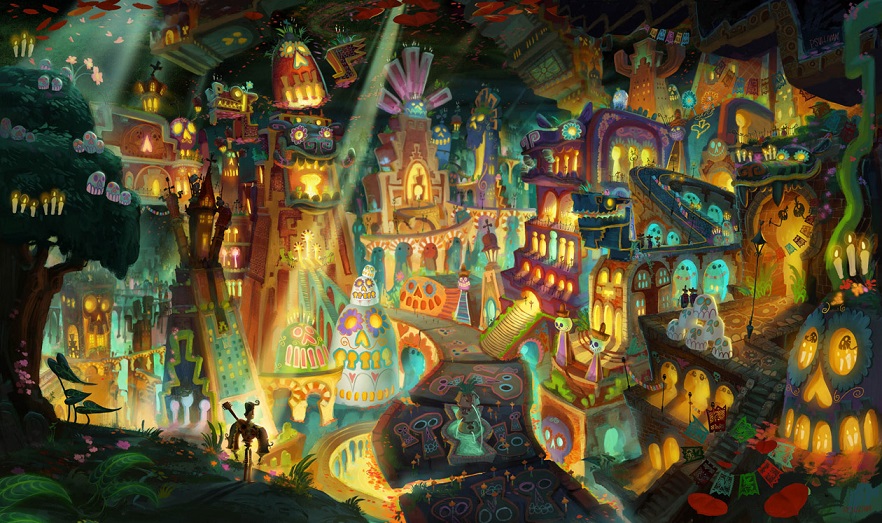Jorge R. Gutierrez wants to teach people about his heritage. He also wants to make colorful, energetic animated films to dazzle a wide audience. With The Book of Life, Gutierrez manages to scratch both itches at once. It’s his first credit as a director and his sixth as an animator; his comfort with the medium shows in each frame, but not nearly as much as his passion for the customs of Día de los Muertos, Mexico’s holiday of remembrance.
Gutierrez hasn’t simply made a movie that’s based around the Day of the Dead’s macabre, misunderstood iconography; rather, he’s made a movie that embraces its rituals and meanings, expounding on the lessons of the three-day festival while seizing every available opportunity to entertain young and old viewers alike. In a best-case scenario, you will walk away from the film in a state of informed delight, smarter than you were before you went in and all the happier for it. Now that’s a cultural experience.
Gutierrez structures The Book of Life as a story within a story. The film begins on a museum field trip, with a handful of delinquent students on a tour of the gallery’s hidden Mexico exhibit, and from there turns into a moral tale of love and loss. The principal narrative focuses on the dynamic trio of Joaquín (Channing Tatum), Manolo (Diego Luna), and Maria (Zoe Saldana), starting from the days of their youth and following them through to their adulthoods. It’s a love triangle complicated first by the boys’ friendship, and second by the machinations of La Muerta (Kate del Castillo) and Xibalba (Ron Perlman). She is the glowing embodiment of death, ruler of the Land of the Remembered, while he presides over the underworld, a dark place where the souls of the forgotten crumble away like so much ash.
In spite of its excesses, Gutierrez miraculously manages to wrap up all its various odds and ends neatly enough by the end.
They’re gods, and as gods will do, they place a wager on whether Maria will fall for Manolo or Joaquín. Trailers suggest that The Book of Life’s plot kicks off when that “friendly” bet goes awry and sends Manolo to the realm of La Muerta. In truth, the film reserves its traipses through the afterlife for its final act, and spends the bulk of its time dealing with the travails of the living. Competition over Maria’s heart drives much of the proceedings, as well as constant threat of attack from roving bandits. While trying to balance all these moving parts, Gutierrez keeps the proceedings briskly zany with hyperactive humor.
If anything, it’s perhaps a bit too hyperactive, not to mention overstuffed. Even at 95 minutes, The Book of Life bursts with thematic through-lines: self-discovery, heroism, romance, challenging gender roles, living in the shadows of one’s ancestors, growing up, and so on and so forth. None of Gutierrez’s ideas are bad, per se; they’re just too many of them, with some threads inevitably less well-developed than others. Would the picture lose anything by dropping Manolo’s struggle with his family’s bullfighting dynasty? Does the movie change drastically if its male leads aren’t bosom buddies? Frankly, it all becomes exhausting after a while.
In spite of its excesses, Gutierrez miraculously manages to wrap up all its various odds and ends neatly enough by the end. Besides, you’ll be too enthralled by the film’s infectious sense of adventure to care about overflow in the first place. Gutierrez’s enchantingly spooky wood-carved aesthetic transcends the messy plot, and that’s true even before he guides us from this life to the next. Once we arrive in the Land of the Remembered, we are treated to an exhilaratingly realized place of perpetual celebration — but as the film makes clear, it’s only one leg of a broader, more personal journey. Just as Día de los Muertos gives its characters a chance to learn about themselves, their pasts, and one another, so too does Gutierrez’s film offer us the opportunity to engage with a tradition that’s not our own. Sure, The Book of Life could have been tighter and more coherent, but there’s no way it could be any more sincere.

